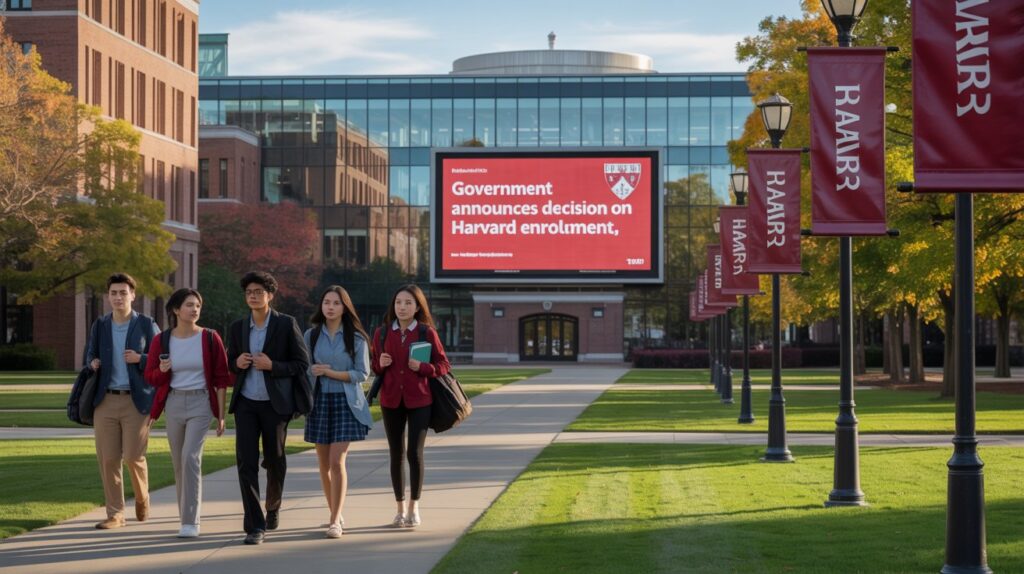Breaking News: Harvard’s International Student Visa Ban and Its Future in US Education
Harvard University, one of the world’s most prestigious institutions, has recently faced a significant setback regarding its ability to enroll international students. In a move that has caught the attention of academia and the international community, the U.S. government under the Trump administration revoked Harvard’s certification under the Student and Exchange Visitor Program (SEVP). This action bars Harvard from enrolling foreign students, raising questions about the university’s future and the broader implications for international education in the United States.
In this detailed blog, we’ll explore what this enrollment status change means for Harvard, why the decision was made, its impact on students, and how this development fits into the larger geopolitical context. We’ll also provide SEO-focused insights, answering key questions like “Harvard enrollment status 2025,” “international students at Harvard,” and “Harvard foreign student ban.”
What Is Harvard’s Enrollment Status Change?
In May 2025, the U.S. Department of Homeland Security (DHS) suspended Harvard University’s certification under the SEVP, effectively barring it from enrolling new international students. SEVP certification allows universities to admit students on F-1 and M-1 visas, which are essential for academic study in the United States.
This suspension means that Harvard cannot sponsor visas for new foreign students, potentially affecting thousands of hopeful applicants worldwide. Existing international students may also face uncertainty about their status.
Reasons Behind the U.S. Government’s Decision
The Trump administration cited concerns about Harvard’s alleged ties with foreign governments, particularly China, and accusations of antisemitism on campus. The government argued these issues posed national security risks.
While Harvard denies these allegations, the move reflects a growing trend of heightened scrutiny of international collaborations and foreign influence in American universities.
Impact on Current and Prospective International Students
The decision has far-reaching consequences:
-
Prospective students: Foreign applicants planning to join Harvard for the 2025 academic year may be unable to obtain necessary visas.
-
Current students: Although existing students are temporarily unaffected, there is concern over the renewal of visas and future enrollment.
-
Academic programs: Collaborative research projects involving international scholars could also be disrupted.
This development may push international students to consider other universities in the U.S. or abroad.
Harvard’s Response and Legal Battle
Harvard University swiftly condemned the decision, calling it unlawful and retaliatory. The university announced plans to challenge the suspension through the courts, emphasizing its commitment to inclusivity and academic freedom.
Legal experts say this case could set important precedents for university autonomy and government oversight of higher education.
Broader Implications for U.S. Higher Education
The move against Harvard sends a chilling message across the American higher education landscape. Many universities depend on international students for diversity, funding, and research collaboration.
A shift towards protectionism or heightened vetting could:
-
Reduce the global competitiveness of U.S. universities.
-
Impact international student enrollment nationwide.
-
Affect cross-border academic partnerships.
What This Means for International Education Policy
The suspension reflects broader tensions in international education policy, particularly amid strained U.S.-China relations and growing geopolitical rivalry. Educational institutions worldwide are monitoring these developments closely to adjust their strategies for global engagement.
Governments and universities may need to reconsider security protocols, visa policies, and international collaborations to adapt to this evolving landscape.
How International Students Can Navigate This Situation
For international students aspiring to study at Harvard or other U.S. universities:
-
Stay informed about visa regulations and university announcements.
-
Explore alternative institutions with valid SEVP certification.
-
Seek advice from education consultants or legal experts specializing in student visas.
-
Consider options for studying in other countries with welcoming policies for international students.
Proactive planning is crucial to avoid disruptions in academic goals.
Conclusion
Harvard’s enrollment status suspension marks a pivotal moment in U.S. international education. It underscores the increasing politicization of academic institutions and highlights challenges faced by international students amid global tensions.
While the situation remains fluid with ongoing legal proceedings, students, educators, and policymakers must stay alert and adaptable. Harvard’s case will likely influence the future landscape of higher education and international student mobility for years to come.
FAQs
Q1: Can current international students at Harvard continue their studies?
A: For now, existing international students can continue, but visa renewals may become complicated.
Q2: Why did the U.S. government suspend Harvard’s SEVP certification?
A: The government cited concerns over alleged ties with foreign governments and campus antisemitism.
Q3: Will Harvard regain its ability to enroll international students?
A: Harvard is contesting the decision legally; the outcome is pending.
Q4: How does this affect international students applying for Fall 2025?
A: New international students may not be able to obtain visas through Harvard currently.
Q5: What alternatives do international students have?
A: Students can consider other U.S. universities with valid SEVP certification or study abroad options.
Popular News:
- Hiring a Search Engine Optimization Consultant Drives ROI in 2025
- Why Hire a Digital Marketing Agency for Small Businesses in 2025?
- Why You Need the Best Digital Marketing Agency in India
- Apple 500 Billion Investment 2025 Updates : AI & Future Innovations Revealed
- OpenAI Acquired AI Hardware Startup ‘io’ for $6.5 Billion

